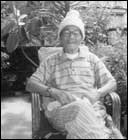 Man Bahadur Rai and the rest of the retreating Gurkhas are plagued with hunger as they cross into India over the Naga hills from Burma. They find an unlikely source of help in an old Naga man who speaks some Burmese. The men stretch out three cans of rice to feed 375 hungry soldiers. Rai's story is part of Lahurey ko Katha, a collection of memoirs based on oral testimonies of 13 retired Gurkha soldiers. Translated from Nepali by Dev Bahadur Thapa for this fortnightly column.
Man Bahadur Rai and the rest of the retreating Gurkhas are plagued with hunger as they cross into India over the Naga hills from Burma. They find an unlikely source of help in an old Naga man who speaks some Burmese. The men stretch out three cans of rice to feed 375 hungry soldiers. Rai's story is part of Lahurey ko Katha, a collection of memoirs based on oral testimonies of 13 retired Gurkha soldiers. Translated from Nepali by Dev Bahadur Thapa for this fortnightly column. We wished there was someone who could understand Burmese. Despite our total ignorance of the local language, we went into a Naga village. Luckily, we met an old fellow who had served as a reserve in the Burmese army. In keeping with Naga customs, he was thoroughly filthy, making him look older than what I estimated was his age, about 45-years-old.
"Sya, do you speak Burmese?" I asked politely. "Sya" in Burmese means "respectable man". He replied that he understood a little. We told him we were hungry and tired and asked if some rice could be spared. He said there was no rice on that side of the hill. We told him we were dying with hunger and asked him what their staple diet was. He replied that they made gruel so we begged him to get some for us because we had eaten nothing for three days and were close to dying.
The shabby Naga told us a shop in the next village used to sell rice, but wasn't sure if the shopkeeper could spare any. We implored him to help us. He shouted in his native language to his neighbour in the lower part of the village and reply came. The fellow there had a small stock and was willing to part with it.
Our Naga friend asked his neighbour to bring everything he had, which was about three milk cans of rice. Our expectation was high but all we saw was a small package wrapped in black rags. On closer inspection, we found out that it was rice of dry land variety. Since they have no husking device they put paddy on stone and beat it with a wooden stick. He charged us Rs 15 or 20 for the lot.
The next problem was distributing three cans of rice among 375 soldiers. Each man would get no more than a fistful. We hit upon the idea of making rice soup so we asked the old man fellow for a big pot. He understood what we were trying to do. Being an ex-serviceman, he took pity on our predicament. He brought us a big earthen pot, which was all he had. When I looked inside, we saw something had burned right into the pot. I was scared the pot would break if we cleaned it with water so we scoured it with a stone to make it somewhat cleaner after which we poured in the rice and water.
Suddenly, while we were busy making our rice, a captain, a major and quite a few British soldiers accompanied by an Assamese porter came into the village. The major was Gurkha and enquired about our wellbeing. We told him we had some rice. They said with a smile that they had only a packet or two of biscuits and could not part with it. The major asked us if we could get a goat. Once again we rushed to the same old man. He said the rest of the village wouldn't understand why, but there was a goat in the village.
The major agreed to buy the animal. I can't recollect how much we paid for the uncastrated goat with a long beard. I got a Naga boy to carry it to our place, for which he received a rupee. I informed the major about the cost of the goat and offered to return the balance. He, however, refused and asked us to keep it. He asked us to slaughter the animal and skin it. All he asked for was a leg, the rest we cleaned, cut and prepared to cook.
We had just one pot, now full of our rice soup, and wondered how we'd cook the meat before hitting upon the idea of grilling the meat although some men ate it raw. We distributed the rice soup equally among the men and everyone relished this meal. That night we slept soundly.
The following day we had enough energy to walk with ease. On our descent we discovered thotne. It grows abundantly in high altitudes and tastes like seasoned bamboo shoot. We stopped and ate to our full satisfaction, but thotne has an intoxicating effect so we all became weak. Nevertheless, we went on crawling. That evening we slept on empty stomachs.


